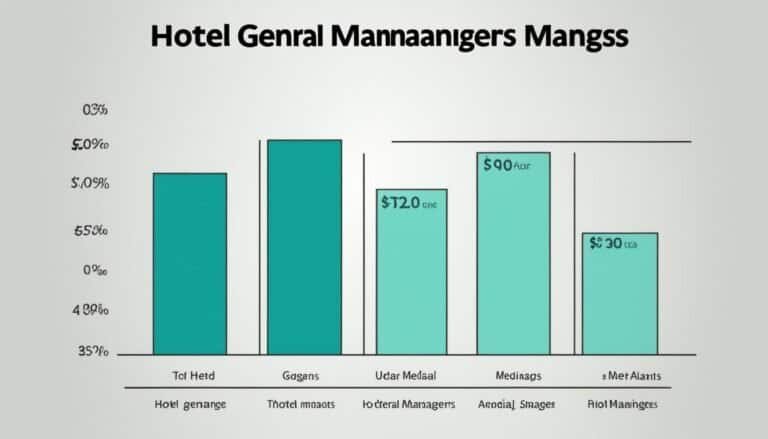Operations Manager Job Titles Unveiled
Operations managers play a crucial role in organizations, overseeing procedures, managing budgets, and optimizing operations. There are diverse job titles within the field, each with its own set of responsibilities and career paths. Let’s explore the different job titles for operations managers and understand the scope of their roles and career opportunities.
Key Takeaways:
- Operations managers play a vital role in organizations, overseeing procedures, managing budgets, and optimizing operations.
- There are diverse job titles for operations managers, reflecting different levels of responsibility and specific skill requirements.
- Operations managers can progress from entry-level positions to senior leadership roles, with opportunities in various industries.
- Career paths for operations managers can include roles such as Vice President of Operations, Director of Operations, and Chief Operations Officer.
- Operations managers can specialize in areas like supply chain management, logistics, or project management, opening up additional career opportunities.
Operations Manager Job Descriptions: Entry, Mid, and Senior Level
Operations managers are essential to the success of organizations, overseeing various aspects of operations to ensure efficiency and productivity. Depending on their level of experience and responsibilities, operations managers can be classified into entry, mid, and senior-level positions.
Entry-Level Operations Manager Job Description
Responsibilities:
- Assist in developing and implementing operational strategies and procedures
- Monitor and analyze key performance indicators (KPIs) to identify areas for improvement
- Support the implementation of projects and initiatives
- Assist in budgeting and financial management
- Collaborate with cross-functional teams to achieve operational goals
- Ensure compliance with relevant regulations and standards
- Conduct regular reports and presentations for stakeholders
Mid-Level Operations Manager Job Description
Responsibilities:
- Develop and execute operational strategies aligned with organizational objectives
- Lead and manage project teams, providing guidance and support
- Analyze data and metrics to identify operational bottlenecks and propose solutions
- Collaborate with stakeholders to define project scopes and deliverables
- Monitor and manage department budgets
- Establish and maintain effective communication channels
- Ensure compliance with legal and regulatory requirements
Senior-Level Operations Manager Job Description
Responsibilities:
- Define and drive the overall operational strategy and vision
- Optimize and innovate processes to maximize efficiency and cost-effectiveness
- Oversee the development and implementation of policies and procedures
- Lead and mentor a team of operations managers and professionals
- Collaborate with executive leadership to align operations with organizational goals
- Establish and maintain relationships with key stakeholders
- Stay updated on industry trends and emerging technologies
These job descriptions provide a glimpse into the diverse responsibilities of operations managers at different levels. The skills and experience required may vary depending on the industry and organization. Operations managers play a crucial role in driving operational excellence and contributing to the overall success of the organization.
Exploring Operations Manager Career Paths
Operations managers have a wide range of career paths to explore within various industries. As they gain experience and develop their skills, they can progress to higher-level roles that offer greater responsibility and opportunities for growth. Some of the career options for operations managers include:
- Vice President of Operations
- Director of Operations
- Chief Operations Officer
The career progression of operations managers depends on factors such as industry experience, leadership skills, and educational qualifications. Individuals with a strong track record of success and a deep understanding of operations management principles are often well-positioned to pursue senior leadership positions. These roles involve managing larger teams, shaping strategic direction, and overseeing the overall operations of an organization.
Operations managers also have the opportunity to specialize in specific areas within operations management. By focusing on areas such as supply chain management, logistics, or project management, they can further expand their career opportunities and expertise. Specializing in a specific field allows operations managers to develop a deep understanding of the unique challenges and requirements in those areas, positioning themselves as experts in their chosen field.
By exploring different career paths and specializing in specific areas, operations managers can carve out successful and fulfilling careers in operations management. The diverse range of career options available to operations managers provides ample opportunities for personal and professional growth.
Image:
Job Titles in Operations Management: Customer Success Consultant, Sustainability Manager, Product Operations Manager
Within operations management, there are specific job titles that operations managers can pursue. Some examples include Customer Success Consultant, Sustainability Manager, and Product Operations Manager. These job titles offer unique opportunities for operations managers to contribute to the success and sustainability of organizations across industries.
Customer Success Consultant
A Customer Success Consultant focuses on ensuring customer satisfaction and long-term success. They work closely with clients, understanding their needs and helping them derive maximum value from products or services. By strengthening customer relationships and addressing concerns, Customer Success Consultants contribute to the growth and retention of clients.
Sustainability Manager
A Sustainability Manager plays a crucial role in promoting environmental responsibility and sustainable practices within an organization. They develop and implement strategies to reduce waste, conserve resources, and decrease the carbon footprint. Sustainability Managers collaborate with cross-functional teams to integrate sustainability principles into business operations.
Product Operations Manager
A Product Operations Manager oversees the operational aspects of product development and launch. They ensure smooth processes, from procurement of raw materials to manufacturing and delivery. Product Operations Managers collaborate with different teams, including engineering, supply chain, and sales, to optimize product operations and meet customer demands.
These job titles require a diverse skill set including knowledge of software as a service, customer relationship management, sustainability reporting, and operations management. Operations managers in these roles can enjoy fulfilling careers in technology, professional services, and financial services.
| Job Title | Responsibilities | Skills | Industry |
|---|---|---|---|
| Customer Success Consultant | Ensuring customer satisfaction and retention | Customer relationship management, problem-solving | Technology, professional services, financial services |
| Sustainability Manager | Promoting sustainable practices and reducing environmental impact | Sustainability reporting, project management | Technology, professional services, financial services |
| Product Operations Manager | Optimizing product development and operational processes | Supply chain management, project management | Technology, professional services, financial services |
By exploring these job titles, operations managers can find exciting opportunities to contribute to different aspects of operations management and make a significant impact on organizational success.
Job Titles in Operations Management: Sales Development Representative, Chief Growth Officer, Business Development Representative
In the field of operations management, there are various job titles that offer exciting opportunities for operations managers. Let’s explore three job titles that highlight different aspects of strategic business growth and sales development.
Sales Development Representative
A Sales Development Representative (SDR) plays a crucial role in generating leads and expanding the customer base, often working under BDR manager jobs that oversee their performance and ensure alignment with business development strategies.
They focus on prospecting, identifying potential clients, and initiating discussions to establish business relationships. SDRs utilize their communication and persuasive skills to drive sales opportunities and contribute to revenue growth.
Chief Growth Officer
A Chief Growth Officer (CGO) holds a senior leadership position with a primary focus on driving strategic growth initiatives. They collaborate with various departments to align business strategies, identify new market opportunities, and develop relationships with key stakeholders. CGOs provide direction and leadership in executing growth strategies to maximize revenue and market share.
Business Development Representative
Business Development Representatives (BDRs) are responsible for expanding the company’s customer base through cultivating new business opportunities. They identify potential clients, build relationships, conduct market research, and negotiate contracts. BDRs play a vital role in driving revenue growth and contribute to the overall success of the organization.
These job titles provide operations managers with diverse opportunities to contribute to the growth and success of the companies they work for. Whether it’s creating new business relationships, driving strategic growth initiatives, or expanding the customer base, operations managers in these roles play a vital role in the organization’s overall success.
| Job Title | Responsibilities | Industry |
|---|---|---|
| Sales Development Representative (SDR) | Lead generation, sales prospecting, driving revenue growth | Technology, professional services, financial services |
| Chief Growth Officer (CGO) | Strategic growth initiatives, market analysis, relationship building | Technology, professional services, financial services |
| Business Development Representative (BDR) | New business opportunities, market research, contract negotiation | Technology, professional services, financial services |
As operations managers, pursuing these job titles can open doors to exciting career opportunities in dynamic industries. Whether it’s driving sales, leading strategic growth initiatives, or cultivating new business relationships, operations managers in these roles play a crucial part in shaping the success of their organizations.
Job Titles in Operations Management: Data Science Manager, Data Engineer, Security Operations Centre Analyst
Within the field of operations management, there are exciting job titles that operations managers can pursue. These roles require a unique set of skills and offer diverse opportunities across various industries. Let’s explore three job titles that are gaining prominence in operations management:
Data Science Manager
Data Science Managers play a crucial role in leveraging data analytics and machine learning techniques to drive operational efficiency and strategic decision-making. They collaborate with cross-functional teams to collect, analyze, and interpret data, providing valuable insights to optimize business processes. Data Science Managers often work in industries such as technology, professional services, and healthcare.
Data Engineer
Data Engineers are responsible for developing, constructing, and maintaining the systems and infrastructure required to process large amounts of data efficiently. They design data architectures, build data pipelines, and ensure data integrity and quality. Data Engineers work closely with Data Scientists and Analysts to create robust analytical systems. They are in high demand across industries, including technology, finance, and e-commerce.
Security Operations Centre Analyst
As cyber threats continue to evolve, businesses are investing in cybersecurity to protect their operations. Security Operations Centre (SOC) Analysts play a vital role in monitoring and analyzing security events, identifying potential threats, and responding to incidents. They ensure the integrity and confidentiality of data, implement security measures, and continuously improve systems to mitigate risks. SOC Analysts work in industries such as finance, technology, and government organizations.
These job titles reflect the growing importance of data-driven decision-making and cybersecurity in operations management. Operations managers with expertise in data analytics, machine learning, and cybersecurity are well-positioned to excel in these roles. The table below summarizes the key skills and industries associated with each job title.
| Job Title | Required Skills | Industries |
|---|---|---|
| Data Science Manager | Data analytics, machine learning, operational management | Technology, professional services, healthcare |
| Data Engineer | Data architecture, data pipelines, data integrity | Technology, finance, e-commerce |
| Security Operations Centre Analyst | Cybersecurity, incident response, risk mitigation | Finance, technology, government |
As operations managers continue to expand their skill sets and adapt to emerging trends, these job titles offer excellent career opportunities in the dynamic field of operations management.
Job Titles in Operations Management: Data Governance Manager, Risk Management Associate
Operations managers in the field of operations management can explore job titles like Data Governance Manager and Risk Management Associate. These roles involve overseeing data quality, risk assessment, and policy implementation. Operations managers with these job titles typically work in industries such as financial services, professional services, and retail.
As a Data Governance Manager, you would be responsible for ensuring the accuracy, integrity, and security of an organization’s data. Your key tasks would include developing and implementing data governance frameworks, establishing data quality standards, and creating policies and procedures for data handling. With the increasing importance of data-driven decision-making, this role offers exciting opportunities to shape an organization’s data strategy and drive operational efficiency.
As a Risk Management Associate, you would play a vital role in identifying, analyzing, and mitigating risks that could impact an organization’s operations. Your responsibilities would include conducting risk assessments, developing risk management strategies, and implementing risk mitigation measures. This role requires a strong understanding of industry regulations, risk management frameworks, and best practices to ensure the organization operates within acceptable risk levels.
“Data governance and risk management are critical components of successful operations management. By ensuring data accuracy and mitigating risks, operations managers can drive operational excellence and secure the organization’s long-term success.”
Whether you are interested in shaping data strategies or managing potential risks, these job titles offer exciting opportunities for operations managers. With the increasing importance of data and risk management in today’s business landscape, there is a growing demand for professionals who can effectively oversee these areas.
Table: Comparison of Data Governance Manager and Risk Management Associate
| Data Governance Manager | Risk Management Associate |
|---|---|
| Responsible for data quality standards and governance frameworks | Identifies, analyzes, and mitigates operational risks |
| Oversees data handling policies and procedures | Develops risk management strategies |
| Ensures data accuracy, integrity, and security | Conducts risk assessments |
| Shapes the organization’s data strategy | Implements risk mitigation measures |
As an operations manager, it’s essential to stay updated with the latest developments in data governance and risk management to excel in these job roles. By leveraging your skills and expertise in these areas, you can contribute to the overall success and growth of an organization.
Senior Manager of Business Operations: Roles and Responsibilities
As a senior manager of business operations, you hold a critical role in overseeing procedures, managing budgets, and ensuring the smooth functioning of a company’s operations. Your responsibilities encompass a wide range of tasks that are integral to the success of the organization.
One of your primary responsibilities is to assess workforce performance and optimize operational efficiency. This involves analyzing performance metrics, identifying areas for improvement, and implementing strategies to enhance productivity. By collaborating with analysts and specialists, you can identify bottlenecks in processes and develop solutions to streamline operations.
Financial management is another crucial aspect of your role. You are responsible for managing budgets, monitoring expenditure, and allocating resources effectively. By employing financial forecasting techniques, you can identify cost-saving opportunities and allocate funds where they are most needed, ensuring the financial health of the organization.
As a senior manager, you are also responsible for ensuring compliance with company policies and applicable regulations. This involves staying updated on relevant laws and regulations, implementing necessary controls, and conducting regular audits to ensure adherence. By prioritizing compliance, you safeguard the organization from legal and reputational risks.
Leadership and guidance are cornerstones of your role as a senior manager of business operations. You are responsible for providing direction to your team, motivating them to achieve their goals, and fostering a positive work culture. By effectively communicating the company’s vision and strategy, you inspire your team to excel and drive towards the achievement of business goals.
Overall, as a senior manager of business operations, you play a pivotal role in driving the success of an organization. Your responsibilities encompass overseeing procedures, managing budgets, assessing workforce performance, and devising strategies to optimize operations. By collaborating with other stakeholders and leading your team, you ensure the smooth functioning and growth of the business.
Now, let’s dive deeper into the exciting career paths and job titles within the field of operations management. In the next section, we will explore the diverse job titles available and uncover the opportunities they present for professionals in this field.
Conclusion
Operations managers have a world of possibilities when it comes to their career paths. With a wide range of job titles and opportunities, they can progress from entry-level positions to senior leadership roles in various industries. The job titles in operations management not only reflect different levels of responsibility but also highlight the specific skills and expertise required for each role.
As operations managers gain experience and continue to refine their skills, they have the opportunity to navigate their career paths and excel in the field of operations management. They can choose to specialize in areas like supply chain management, logistics, or project management, opening doors to even more diverse career opportunities.
Whether it’s becoming a Vice President of Operations, Director of Operations, or Chief Operations Officer, operations managers can achieve success and make a significant impact on an organization’s success. By staying updated with industry trends, continuously learning, and honing their leadership abilities, operations managers can carve out successful and fulfilling career paths.







